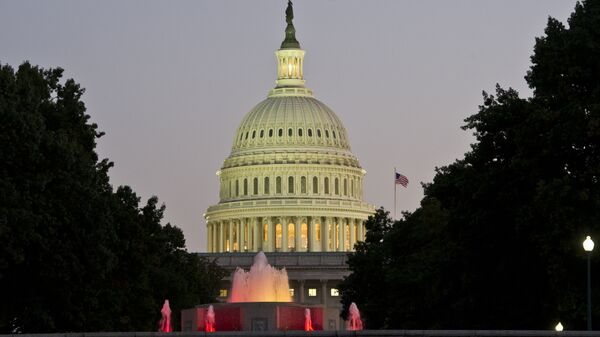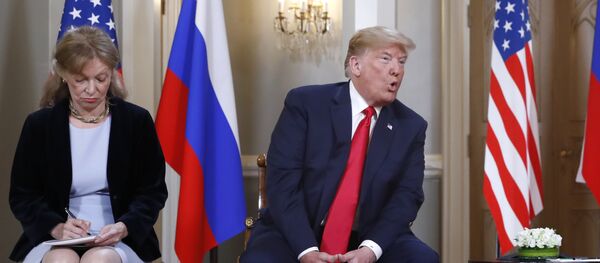Several officials from both the Barack Obama and George W. Bush administrations spoke up against the idea of subpoenaing US President Donald Trump's interpreter Marina Gross, who was present during Trump's private talk with Russian President Putin during their recent summit in Helsinki.
"For the same reasons why we need to protect our own diplomats, there is a real concern about having translators be subject to subpoenas," says David Mortlock, director of international economic affairs at the White House National Security Council (NSC) under Obama, according to The Hill.
"They're at the center of diplomatic relationships, and it raises concerns about whether you can truly have diplomatic communications," he said of interpreters.
Another NSC official from Obama administration, Ben Chang, said that while the Congress should get to the bottom of the summit, they should instead summon and question officials such as Secretary of State Mike Pompeo and National Security Adviser John Bolton.
Tony Fratto, who served as a White House deputy press secretary under former President George W. Bush, called the idea of subpoenaing Gross a "fruitless effort."
"The law is clear. It would be bonkers to think this conversation doesn't fall under executive privilege," said Fratto, who, according to the Hill, frequently disagrees with Trump's rhetoric and actions. "That's not their job, and the Constitution is pretty clear on that."
Richard Fontaine, a long-time Russia critic who has served as a foreign policy adviser to Senator John McCain and on the NSC under Bush, also dismissed the suggestion.
"I feel [the Dems'] pain, but I don't think forcing the translator of the president to testify [about] what she heard will be successful," Fontaine said in an interview with The Hill, calling it "bad practice."
"People on the Hill seem to have ever-short historical perspective, but at some point a Democrat will have a one-on-one with a leader or take a walk in the park with a leader, and do you really want that?" he continued. "I know they want this, but I don't know that they want that."
The Dems have justified the proposal by saying that circumstances of the Trump-Putin summit were "extraordinary:"
"I think these are pretty extraordinary circumstances," said Representative Adam Schiff, the top Democrat on the House Intelligence Committee, The Hill reported. "It is not something I would recommend as an ordinary remedy in usual course of business, but I would hope that we would never again see a circumstance where the president of the United States would say, ‘I want to meet alone with my foreign adversary.'"
An even if the Dems somehow manage to overcome the GOP Congress, the president would likely invoke executive privilege, said Mark Rozell, dean of George Mason University's Schar School of Policy and Government, who also authored a book on that particular presidential power.
"The president would be fully within his authority to claim executive privilege in this case," he said, also pointing out that an interpreter's testimony could spill more national security beans than the interrogators might intend.
"It is likely that the two heads of state had discussions about some sensitive issues with national and international security implications, and it would not be reasonable to expect an interpreter to know which topics require confidentiality," Rozell added.



